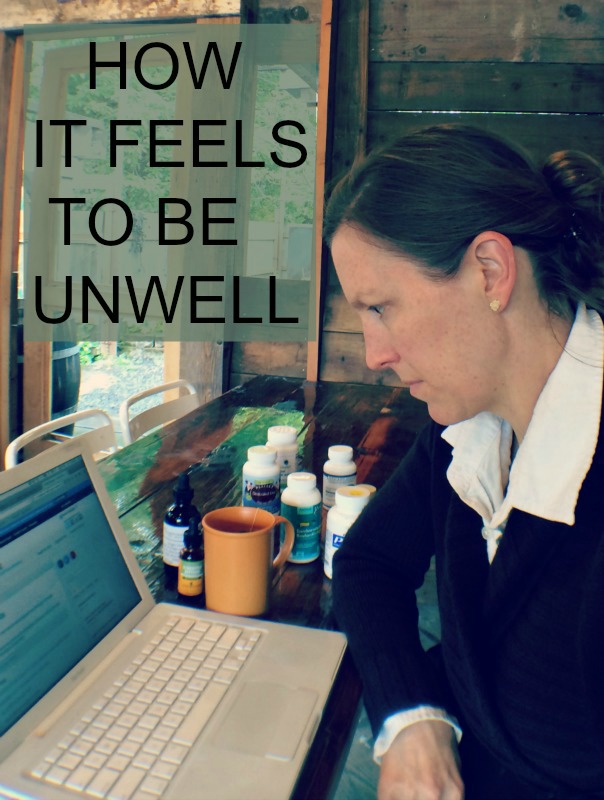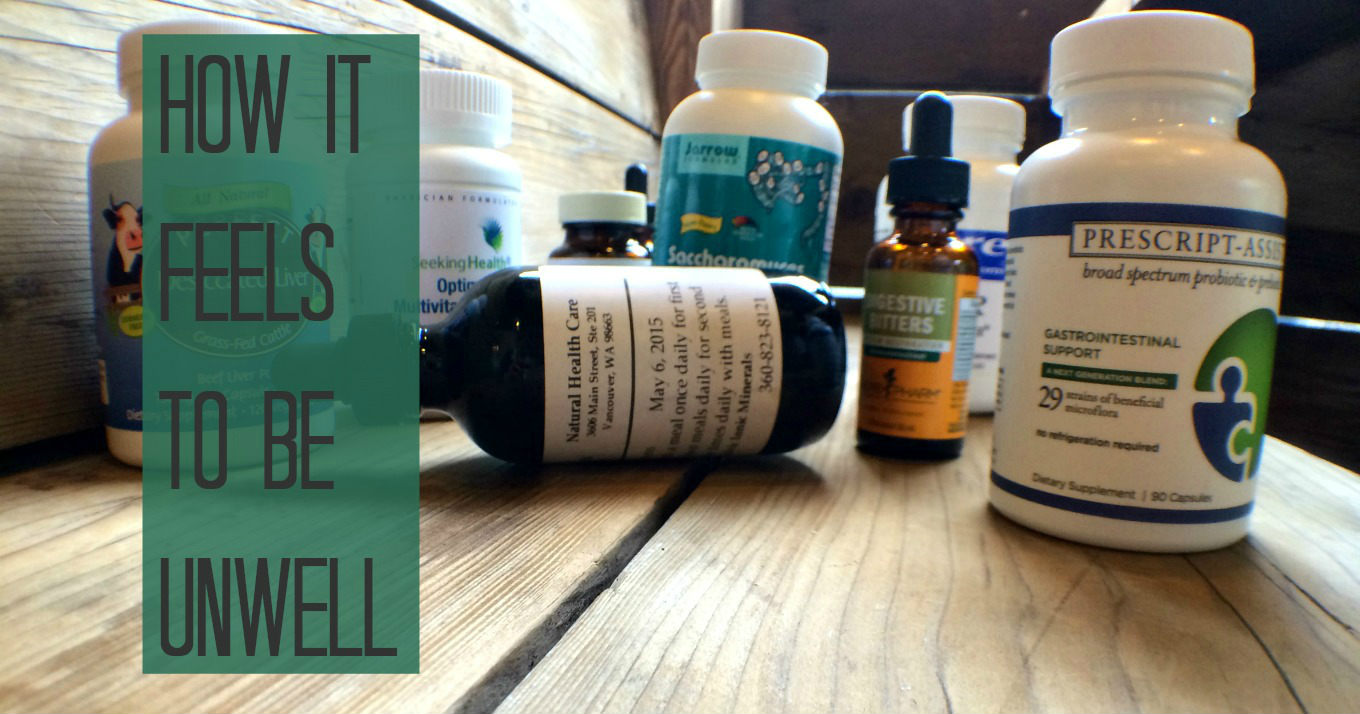Many of us are on healing journeys. We live in a time when factory-made foods and over-use of antibiotics have made us sick.
Weston A. Price discovered in the 1930s that indigenous people groups untouched by Western medicine and Western food were shockingly robust and resistant to disease. Enter 21st century Americans, in stark contrast.
So how does it feel to be unwell?
We are, some of us, isolated, ignorant, yet longing to be well. But we are a community, together, seeking healing and answers.
HOW IT FEELS TO BE UNWELL
Below I describe how it feels to be unwell, according to many of my clients’, and according to my own, experiences. Can you relate?
- Tired. Running errands is enervating. Meals and chores suffer, or are done with forced effort. Naps are awesome. But nighttime sleep is often broken by insomnia. There’s no energy to exercise, sometimes for years; and there is guilt or disappointment about that.
- Slow, with setbacks. Right when progress occurs in one area, another symptom or disease crops up. It is hard to persevere. We make strides with a skin rash only to find out we have kidney stones or SIBO or a histamine allergy. It’s discouraging and our doctors may not have the answers. (Our doctors want to put us on antibiotics, which is what first got us into this mess.)
- Scary. Some of us look at our mortality long before we want to. We are faced with our degeneration, contrasted with what we want to be doing or how we want to be feeling. In some cases we have to prepare for death or limitations that we didn’t “sign on for.”
- Isolating. Beyond immediate family, no one cares to know about invisible sickness. The only people that want to talk are the ones who are also unwell. Those who don’t care aren’t totally lacking in empathy; but they don’t exist in the same paradigm. Sick people that look well are an anomaly. Socializing becomes sooo hard. We can’t eat or drink with our friends. We’re not as much fun to be around. We don’t enjoy social occasions anymore, without a treat in our hand. (And we’d rather be taking a nap anyway.)
- Long. We originally set out on a certain medication or diet and expected it to last for maybe 2 weeks, 6 months, 2 years. Before we know it, that time has gone by. We have made progress but realize we have years more ahead. Would we have chosen this protocol if we knew how long it would take?
- Liberating. At times former addictions go. We realize we couldn’t care less about chocolate or sugar or (fill in the blank) and we kind of miss that old addiction. But then we slap ourselves and praise God; because we realize we are getting well! And it’s awesome to actually like bone broth and to feel satiated by savory food. A big bite of homemade sauerkraut is the perfect ending to a meal and we feel satisfied without longing for more. Our bodies are utilizing nutrition. There are no more pathogens calling the shots, demanding starches and sugars. We sleep through the night; and we know which supplements to take, what they do and why they’re helping. We see an end in sight.
I am speaking from experience, of course. My husband and I said goodbye to each other 5 years ago, when a cardiologist told me I didn’t have long to live. I kept that secret from most of our friends and relatives. I wrote memories and adoring thoughts regularly in my children’s baby books, so they’d know me, how much I loved them and longed to live.
But living is what I kept on doing until one day I met a doctor who told me I was not dying of heart disease.
I’d like to share with you a few pieces of wisdom I’ve gained since that time; and I hope these nuggets will be pearls of encouragement for you.
PUTTING AUTOIMMUNE DISEASES INTO REMISSION
1. Search your budget and keep looking for the right doctor. I have seen close to 20 medical, functional and naturopathic practitioners in the last 20 years. I have only found 5 that were beneficial to my process of healing. In the past few years I have gotten better at only pursuing care from those I firmly believe can advance my knowledge and wellness. I glean as much as I can from that practitioner and then I set out, again, on my own.
2. Be your own best advocate. While, on the one hand, you need the best practitioners in your arena, nothing can replace you doing your own research. Most doctors won’t spend as much time as you will looking up your condition(s) and all the related treatments or factors that may weigh in.

3. Diet- not to lose weight, but to heal. Look into AIP and GAPS diets to see what’s right for you. Different autoimmune conditions benefit from different dietary protocol. Find the one that suits you best and then focus on what you can have food-wise. Learn to love fresh produce from the farmer’s market (instead of some former treat). Find a sweetener that works for you, if you like treats: usually raw honey or stevia. Delight in the beauty of simple whole foods.
4. Don’t get discouraged my how much natural foods cost. Let this become creative and fun. Where can you buy bulk or discounted organic produce? Where can you buy bulk, grass-fed meat? Buy ground meat and use herbs to make meatballs. Add vine-ripened tomatoes or fall in love with coconut manna (homemade is really inexpensive). It’s becoming cliche; but that’s because it’s true: real food is cheaper than medical healthcare.
5. Reach out to your online community. While this day and age brings with it disease and sickness, it also provides information with greater efficiency than any other time in history. Find bloggers who understand, who share recipes and health-related articles. Find functional practitioners who are on the front lines, sharing the best of what they know, empowering you *for free* toward wellness.
Please check out my blog, Eat Beautiful, and my Facebook page. My most recent discovery, toward our family’s wellness, relates to the MTHFR gene mutation. If you have an autoimmune condition and haven’t yet been tested for this, I recommend looking at Dr. Lynch’s site and doing the mail-in saliva test. Why? The correct supplementation can help your body to detoxify. It was the missing piece in our family’s healing.
Cheers, Friends. As I’ve said before, we’re in this together. What can you add? What advice do you have for others who share a healing journey? What questions do you have?
 |

















Thanks for the encouragement.
You are welcome. <3
I would like to see more encouragement for UnWell people to find holistic practitioners- naturopaths, herbalists, nutrition counselors. I did not see anything in the article advocating that, but when I feel Unwell, that is what i go for- first and foremost- that kind of advisory and protocols and methods over anything else.
Thanks, Mary, for your comment. In my post, it was only implied when I listed the naturopaths and functional doctors I have been to, some of whom specialize in acupuncture, herbs and energy treatments. I also mention functional doctors here: “Find functional practitioners who are on the front lines, sharing the best of what they know, empowering you *for free* toward wellness.” In any case, thanks for adding your own #6. 😉
Holistic practitioners need to get with it regarding insurance (in a few states, insurers are required to cover their services just like conventional practitioners’, so clearly it is possible). I can’t afford to see anyone who doesn’t take my insurance, I just don’t have that kind of money sitting around – BIG difference in the monthly budget between a $10 co-pay and a $250 office visit. Changing insurers isn’t an option.
Great post… I’ve been on this awful journey for 6.5 years so I know the feeling. I’ve seen 40+ practitioners across Canada and the USA, and the root cause for me is still a mystery. It sucks. I did just want to say, though, I did the 23andMe testing a few months ago, found that I am Compound Heterozygous for the MTHFR genes. I tried following Dr. Lynch’s protocols, only to find my body could NOT tolerate them. (I mean, like, REALLY couldn’t tolerate them. Think: total crash.) I think it’s important to point out about MTHFR that, even if you’re Hetero or Homo for the genes, doesn’t mean it’s a simple answer. You may have other mutations that muddy the water, you may have to deal with other, underlying conditions first… and so on. (Plus, just because you have the mutations doesn’t mean the genes are necessarily turned on… so that still may not be the answer.) It’s complicated, frustrating and quite discouraging. But your post is dead on… thanks for writing it.
Kim, thanks for your comment. I’m so sorry for your long and discouraging process!! Have you listened to Dr. Lynch’s podcasts already? He emphasizes starting with the smallest dose of supplementation when opening up detox pathways. I also started with too much at first and was knocked out with extreme fatigue. I not only had to back off, I also had to use one of his specific B-vitamin complexes. It worked better than the one my naturopath put me on. Basically, I had to play around with it until I got it right. I wish there were more practitioners who listened to his podcasts. He really tries to educate about all the subtleties and intricacies involved. Of course he also reminds us that the gene mutation will not be THE magic bullet for many of us, but that it can provide significant advancement or a breakthrough in healing. It is certainly an important piece. Do you have a practitioner who guided you through your process of supplementation? You are welcome, for the post, and glad it resonated. Sending well wishes.
Oh lady. You are telling my stories. There is nothing worse than feeling unwell, looking fine, and trying to explain that you know something is wrong with your body either to friends or doctors who “just think you’re fine.” That picture of you with all the supplements doing your own research is totally me. And I’m so glad that I listened to the small voice inside that said “something is wrong; you can find the answer” instead of listening to my well meaning doctor, endocrinologist, and acupuncturist. It has taken 3.5 years to get to a place of near stability, and I estimate it will be another year before I’m back on track (sleeping every night, not exhausted all the time, not feeling dizzy/sick/etc at any given time). It does feel great to feed my body what it needs. And it also feels good to have an answer to give to other women who are secretly going through the same thing, and just don’t know what is wrong or where to turn. Thank you for sharing your story. It’s so validating for those of us who have struggled/are struggling to get better when every single person we meet does not believe or does not understand!
Hi Phoebe, thanks for sharing!! We are indeed a community of support and encouragement for one another. Who would have thought the internet could make the world a little warmer? Blessings as you continue on your journey.
Wow, this is the story of my life. Thank you so much for this! I have passed it on as well. It is so encouraging to know others are on the same journey and can relate.
I’m so glad it is helpful! <3 Hugs and blessings as you keep finding the answers.